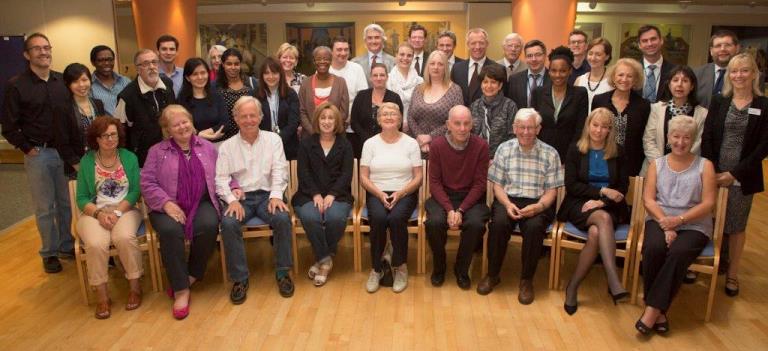 On Friday 3 October 2014, patients, relatives, clinicians, scientists and academics got together in the Sir Williams Wells Atrium for a patient forum on cystic tumours of the pancreas. It proved to be a fascinating meeting with five brief presentations from clinicians, researchers and a patient who had survived pancreatic cancer.
On Friday 3 October 2014, patients, relatives, clinicians, scientists and academics got together in the Sir Williams Wells Atrium for a patient forum on cystic tumours of the pancreas. It proved to be a fascinating meeting with five brief presentations from clinicians, researchers and a patient who had survived pancreatic cancer.
The majority of the meeting was devoted to seeking patient opinions, ideas and feedback on three crucial areas around the diagnosis, care and treatment of patients who have been found to have pancreatic cysts.
There were three workshops and each of the 18 patients attending the meeting chose which workshop they wanted to join.
The first workshop focussed on reviewing a newly produced patient information leaflet. The majority of patients said that they preferred a briefer leaflet with a general overview with the option of more information when needed. The dangers of using non-validated websites were discussed; patients wanted to be informed of the trustworthy sites. It was suggested that a customised leaflet and/or website, with further additional information/links would cover everyone’s needs. We were reminded that not all patients use the internet, so it was important to have paper information when requested. The content that the patients thought most useful included lists of possible symptoms to be aware of, what to do in the event of symptoms worsening, advice on diet and contact details for the clinical nurse specialist.
The second workshop focused on future questionnaire based studies. This group included patients, local clinicians and visiting collaborating researchers from the Public Awareness of Cancer Unit, Porto, Portugal. Patients and clinicians felt that these studies could address important questions surrounding the quality of clinical services provided, anxiety surrounding surveillance and the acceptability of current investigations. The group also reviewed the first draft of a questionnaire for a new study to assess perceived risk and anxiety in patients under surveillance for pancreatic cystic lesions (PAPERPAC). The study is expected to begin at the Royal Free London in the next year.
The third workshop had a discussion around the current research projects, which were all about finding the “perfect” test. Clinicians all expressed concern around following up patients for months and sometimes years, when the risk of a person with a pancreatic cyst developing pancreatic cancer was still relatively low. The risks of not following up patients were weighed against the repeated anxiety caused by regular scans and biopsies to search for “pre-cancerous” lesions. Most patients did not want surgery if the risk was very low, so researchers were looking to develop minimally invasive treatments, for example injecting drugs into the cyst, rather than surgically removing it.
All patients entered in the discussions and many of the patients signed up to attend further focus groups. The feedback was very encouraging with patients describing the forum as “stimulating” and “informative”. At the end of the meeting, one patient stood up to thank the organisers for holding the forum and said, “It’s made us all feel a lot happier!”
 Translate
Translate